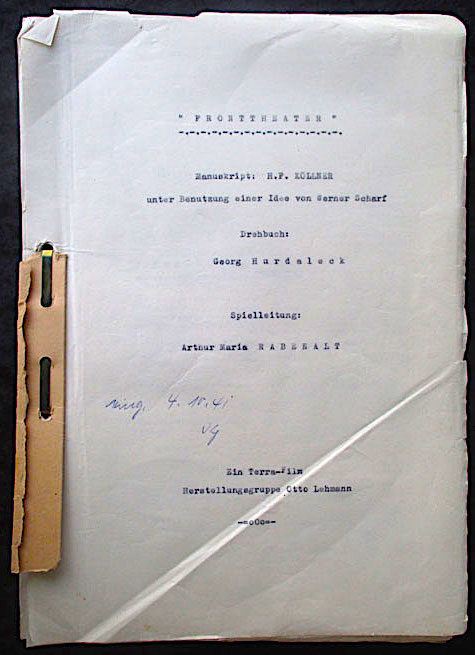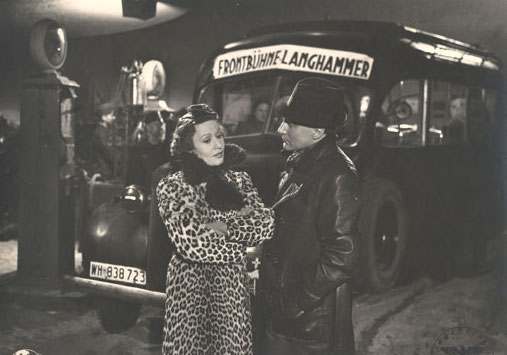- Home
- POSTER GALLERY
- ❗️BOOK & POSTER STORE❗️
- About the Posters
- The William Gillespie Collection
- Our Publishing House
- ❗️GFDN interviews author and collector William Gillespie ❗️
- Our most expensive & inexpensive finds!
- ❗️***NEW!*** Poster of the Month ❗️
- ❗️NEW ❗️Film Posters – Demands on an important means of film advertising. ❗️
- In our Book + Zeitschrift Library
- ❗️ ***NEW!*** Hitler Youth Quex – A Guide for the English–speaking Reader ***NEW!*** ❗️
- ❗️***NEW!*** Table of Contents of our new HJ QUEX book❗️
- ❗️Hitler Youth Quex Guide - early praise! ❗️
- Recent loans from the Collection
- Farewell Horst Claus. (1940–2024)
- "Der Deutsche Film" Zeitschrift
- ❗️ ***NEW!***German "Tendency" Films (Tendenzfilme) in the Third Reich ❗️
- KARL RITTER
- Karl Ritter original film posers in this Collection
- "Besatzung Dora" ( † 1943)
- "The Making of The Crew of the Dora"
- Karl Ritter at the 1938 Reichsfilmkammer Congress
- INDEX -"Karl Ritter" book, 2nd edition
- Karl Ritter's Legion Condor (1939, unfinished)
- Excerpt from our "Dora" book
- ∆∆∆∆∆ High praise for our DORA book! ∆∆∆∆∆
- TABLE OF CONTENTS – "Legion Condor"
- § § § § § Early Praise for our LEGION CONDOR book! § § § § §
- ❗️"Das Leben geht weiter" and Karl Ritter ❗️
- Zarah Leander Europe–wide !
- Japan Military Film and Karl Ritter
- Karl Ritter after 1945
- 1935 Film Congress
- Poster Exhibition in Berlin, March 1939
- Potsdam poster exhibition 12 April–25 August 2019
- Leni Riefenstahl's two "Olympia" Films (1938)
- "Ohm Krüger" (1941)
- Emil Jannings
- "Blutendes Deutschland" (1933)
- Hannes Stelzer ( † 1944)
- Klaus Detlef Sierck ( † 1944)
- Film stills
- Reich Film Censorship Offices
- ❗️Dateline: Ufa - April 11, 1945 ❗️
- ❗️***NEW!***The Fate of the German Film Industry in May 1945 ❗️
- Film censorship cards
- Film Archives
- Cinema advertising
- School filmstrips
- ❗️UPDATED❗️ Z F O / Ostland Film G-m-b-H
- Z F O / Herbert Jacobi estate
- ZFO / Ostland Film newspaper articles
- ❗️***NEW!*** Roter Nebel / Red Fog / Red Mist (1942/1943, ZFO) ❗️
- ZFO - Der Rückkehrer - The Returnee (1943/1944)
- The D F G production company
- D I F U
- ❗️ ***NEW!*** "Carl Peters" – Special Collection. ❗️
- "Alcazar" (1940, Genina)
- "Der 5. Juni" (1943, banned)
- ❗️ ***NEW!*** Herbert Selpin and his "Titanic" (1943) ❗️
- ❗️ ***NEW!*** Ein Robinson (1940, Fanck) ❗️
- "Fronttheater" (1942)
- Veit Harlan's Jud Süß and Fritz Hippler's Der Ewige Jude
- Harlan "Jud Süß" trial 1949
- Werner Krauss & JUD SÜß
- Anti-Semitic Film Posters in the Collection
- "Heimkehr" (1941)
- "Hitlerjunge Quex" (1933)
- ❗️***NEW!*** Hitlerjunge Quex in 111 Greater Berlin Cinemas ❗️
- Jürgen Ohlsen
- "S.A.Mann Brand" (1933)
- "In der roten Hölle" (Edgar Neville, 1939)
- "Helden in Spanien" (1938)
- The Spanish Civil War in Film
- Andrews Engelmann (1901 – 1992)
- Deutsche Wochenschau
- Uƒa Feldpost
- Uƒa Kulturfilm – Informationen
- " Die Tochter des Samurai" (1937, Fanck)
- Ufa 25th Anniversary
- Invitations to world premieres
- ❗️***NEW!*** Continental Films, Paris 1940–1944 ❗️
- Film Censorship in Occupied Paris 1942
- "Der Sieg des Glaubens" (1933)
- Wilhelm Althaus Estate
- Weimar Germany posters
- Ufa and the Ordensburgen
- The Gaufilmstelle in our Collection
- "Zwei Welten" (1940)
- "Capriccio" (1938) –Karl Ritter film album
- Unrealised NS Propaganda Films 1934–1945
- German Film Directors accused of "war crimes"
- Australian––themed NS feature films
- "Der Störenfried" / "The Troublemaker"
- What was new in 2014?
- What was new in 2015?
- What was new in 2016?
- What was new in 2017?
- What was new in 2018?
- What was new in 2019?
- What was new in 2020?
- What was new in 2021?
- What was new in 2022?
- What was new in 2023 ?
- What's new in 2024?
- ❗️***NEW!*** Hitler assassination attempt in Karl Ritter film cut❗️
- BESATZUNG DORA private photos
- Just discovered 1942 article on BESATZUNG DORA
- The Karl Ritter Tetralogy
- Google Analytics 2023
- Our first–ever acquisition!
- ❤️"Some of our favourite things....!"❤️
- ERRATUM for our " Hitler Youth Quex Guide"
- Trending
- Vale †
- Our Wants List / 2024 / Wunschliste
- Pop Quiz
- Unsere KARL RITTER Bücher in Deutschland liefbar!
- WHERE to buy our books right now?
- ✉️Contact
 “History is not about the facts. It is about the context and who is telling the story.” —Prof. Milton Fine.
“History is not about the facts. It is about the context and who is telling the story.” —Prof. Milton Fine.
"Who controls the past controls the future: who controls the present controls the past." –– George Orwell in his novel "1984."
"Whoever doubts the exclusive guilt of Germany for the Second World War destroys the foundation of post–war politics." –– Prof. Theodor Eschenberg, Rector, the University of Tübingen.
"If we have our own why in life, we shall get along with almost any how." – Friedrich Nietzsche
POSTER GALLERY --view
over 500 German film
original posters between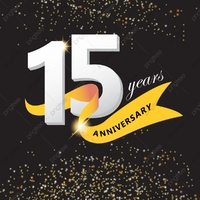
1927–1954 from
Germany and from
many Axis and Neutral countries
across Europe!
Note! Posters in the Poster Gallery are PERMANENT
acquisitions which are NOT FOR SALE!! ONLY the
posters listed in our POSTER STORE are for sale.
(They have a price and order button to use.)
Our Poster of the Month : Fronttheater
We highlight monthly a propaganda film poster which visitors may find interesting as the film itself is still banned in certain European countries and/or therefore virtually unknown today.
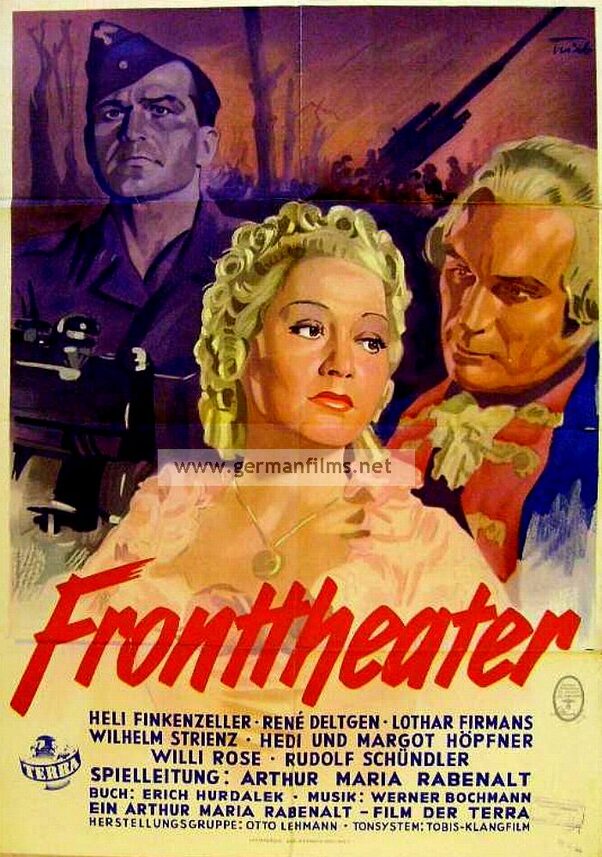
This month, we present the 1942 production from the Terra Film GmbH studios entitled Fronttheater.
FRONTTHEATER, an overlooked Third Reich propaganda film from late 1942.
Fronttheater belongs to a handful of Third Reich feature films binding the home front to the German war front. The better-known films of this small genre are Request Concert, the Zarah Leander vehicle The Great Love, and Ritter’s The Crew of the Dora.
Fronttheater premiered in Berlin in September 1942 and the film's review stated:
“This film has no role models. In fact, something completely new and probably unique has been created with it. The term "front theater" originates from our days. In order to give our Wehrmacht, from the Channel coast to the Caucasus and from the Arctic Ocean down to Greece, hours of rest and reflection, countless troupes of actors travel uninterruptedly with their omnibus over thousands of kilometers, only to return to the Reich capital after weeks, often after months. Small and primitive are often the stages, which have to be set up in a stable or under the open sky, but on other days they play in castles or magnificent theater halls. However, whether it is with the cheerful or the serious mask, the artists always give the best they have to give from the bottom of their hearts, and therefore they are sure of the thanks of the front.”
In the press book for the film, a notice on the front cover reads:
“At the start of the war, the Oberkommando der Wehrmacht in cooperation with the Reich Ministry for Public Enlightenment and Propaganda and the NS-“Strength through Joy” Community created the Wehrmacht Stages. Everywhere, where soldiers fight and are on guard, German artists should delight them. This film tells of their work.” The opening titles in the film express similar remarks.
The Wehrmacht had some concerns about the film before it was released. It demanded that “the exaggeration of the dangers and hardships of troop maintenance must be mitigated.”
The film cast is outstanding, with Lena played by Heli Finkenzeller and Paul by René Deltgen. The supporting roles were performed by Lothar Firmans, Willi Rose, Rudolf Schündler and Bruni Löbel, as a true touring ensemble. The Höpfner twins, Hedi and Margot – superb dancers who appeared regularly at the Berlin Opera House and other major performing arts venues – were specifically requested by Adolf Hitler to appear in the film, according to Director Arthur Maria Rabenalt. The popular singer Wilhelm Strienz, who also appeared in the film Request Concert (1940) sings among other songs the famous "Bells from Home" which ends the film. Actor Heinz Rühmann also makes a cameo appearance in the hotel when the troupe arrives and is checking in.
In late April 1942 a live television broadcast of the film’s main actors, dancers and singers took place in a closed-circuit transmission to wounded soldiers in German hospitals in major cities. It was staged in the cupola of the 1936 Olympic stadium in Berlin. A film newspaper reported: “[Greek goddess and Muse] Dame Thalia could hardly have demonstrated the record-breaking ability of her youngest child -- Front theater -- than at this afternoon event of the television station in the cupola of the Reichssportfeld in front of wounded from Berlin hospitals. Front theater, a broad term in itself, became a film and, thanks to the film, is now a long-distance broadcast that combined film and radio with all the ingredients of a cheerful front theater to create a tasty feast for the eyes and ears. “
The Director Rabenalt related in his memoirs that “Troop care was the responsibility of the “Kraft durch Freude” organization, for which Robert Ley was responsible. So Fronttheater was his film. Goebbels despised Ley beyond measure and didn't begrudge him the film. He claimed his rights to the film, also because of the topic "theater" it dealt with. A legal problem, you could say. There were disputes in which Goebbels was not always victorious. In some cases, he had to back down.”
Despite his animosity to Robert Ley, the Propaganda Minister did confer two predicates for the film, those being “state-political valuable” and “valuable to the folk.” These awards signalled that the film was important to the regime but also provided cinema owners with a tax reduction on ticket sales as an inducement to screen the movie in their cinemas.
Daily life in Berlin was depicted without the subsequent Allied terror bombings, and significant scenes were shot in Bordeaux, in Biarritz and in the Channel coastal area in Occupied France, as well as in Occupied Greece and Crete. The film studios in Berlin, Rome, Amsterdam and Den Haag were all used to prepare the final cinema release. Filming took place in early 1942, and ended in Greece in late May that year. The review of the film premiere also remarked on the harmonious blending of actual Wochenschau combat footage within the film.
The final scene of the stage performance in the Athenian amphitheater is a highlight of the film, and it required an audience of soldiers to complete the scene. A handbill dated May 1942 Athens-Crete headed "Attention - Recording!" promised Wehrmacht soldiers '"two colorful hours of performance by the artists in the Terra Film FRONTTHEATER."
The film was a big hit with the German public, attracting almost 17 million audience members. The review in the Berliner Morgenpost newspaper proclaimed: "The actors... hit the atmosphere of the new, the great, the unique and made it come alive for hundreds of thousands…” The Hamburger Frendenblatt stated: “Actors, artists, dancers…..all are all happy to give joy.” It ranked 19th out of the top 100 films that year, surpassing many more famous films better known today.
Unfortunately, as was the fate of Karl Ritter’s The Crew of the Dora the following year, military reversals in the months following the premiere caused Fronttheater to be withdrawn from circulation inside the Reich. It did have subsequent cinema seasons in The Netherlands and in Finland, Greece and Hungary. The film was shown as late as July 2, 1944 in Riga, Latvia at the Grand Kino. Neutral Switzerland forbade the film to be shown, calling it “unwanted propaganda,” with the Censorship Office stating: “Since the Swiss public is aware of the suffering of the population in the occupied countries, the propagandistic, untrue representation could lead to disturbances in internal security.”
Fronttheater, which did not reach German cinemas until September 1942, is a film totally ignored by the main Third Reich film histories in both English and German editions. These books focus primarily on all the well-known wartime documentary films such as Baptism of Fire or Victory in the West, and military feature films such as Stukas, DIII88, and U-Boot Westwards! which were produced between late 1939 and the end of 1941.
Fronttheater provides audiences with not only an important home front – war front film but the only depiction of the vast “Fronttheater” touring companies which entertained German soldiers from France to the Occupied USSR and from Norway to North Africa.
For further information on this film, please visit our web page here.
The Collection has the two German posters, the Hungarian poster, the pressbook and sixteen film stills and press photos of the film. In April 2014 Fronttheater memorabilia from Feldwebel Alfred Sonntag was acquired at auction. He was technical leader assigned in May 1942 to the Terra Filmkunst artists and crew by the "Strength through Joy" organisation in Greater Saloniki to assist with the film.
Materials in his estate include 9 behind–the–scenes B&W photos (three of the photos are shown below) of the film–shoot at the Acropolis, film announcements to the Wehrmacht about the film shoot, personal correspondence between himself and the two actors Deltgen and Willi Rose into 1943; and a Fronttheater 'Erinnerung' sheet signed by eight film crew, including the Director, Cameraman, Productions Head; as well as all twelve actors and actresses,as well as the two ballet dancers, the Höpfner sisters.
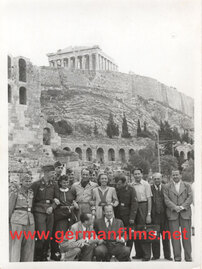
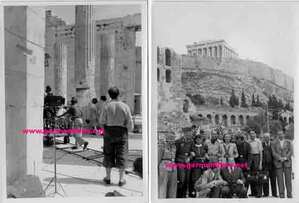
In 2022, we acquired the complete typewriter carbon copy of the film's script.
